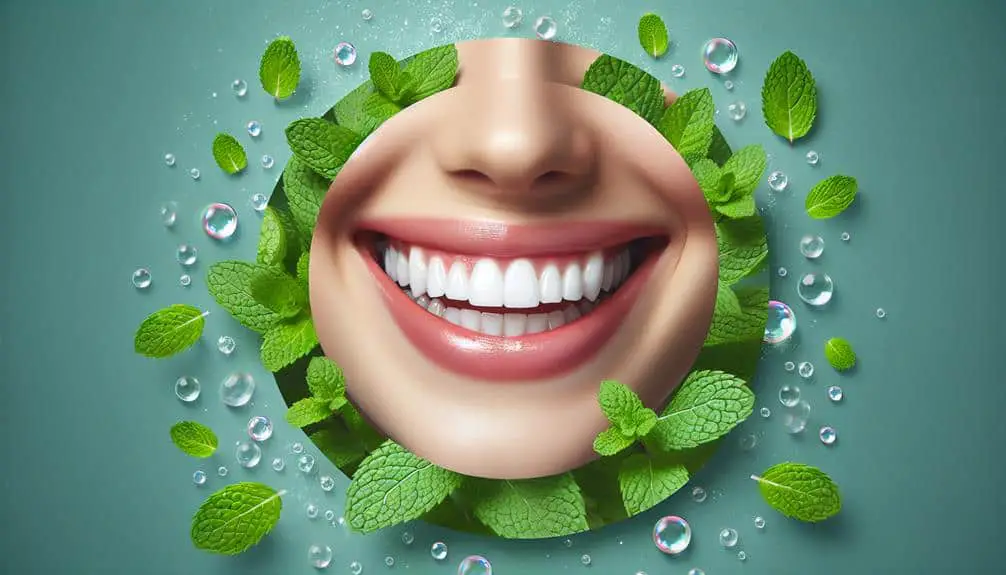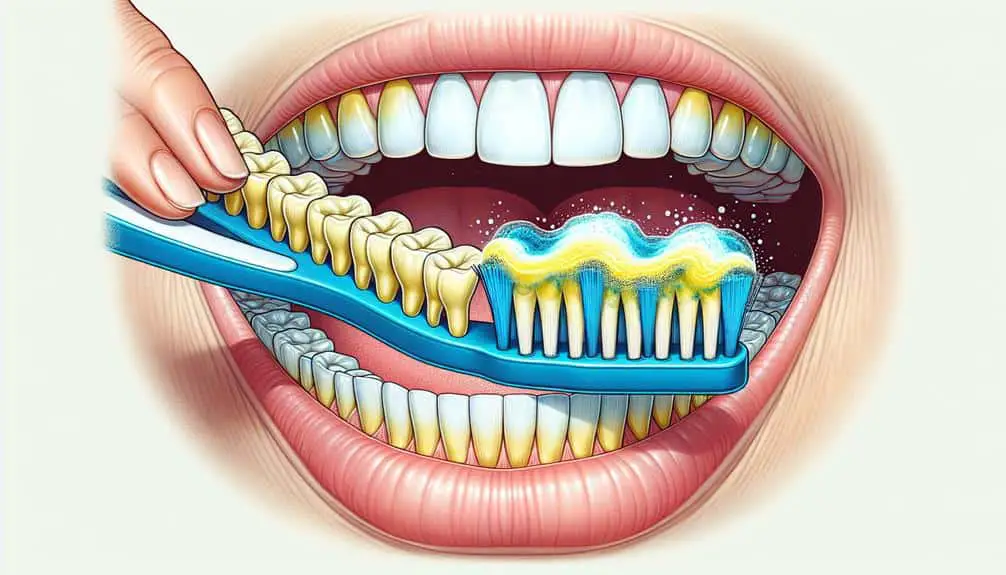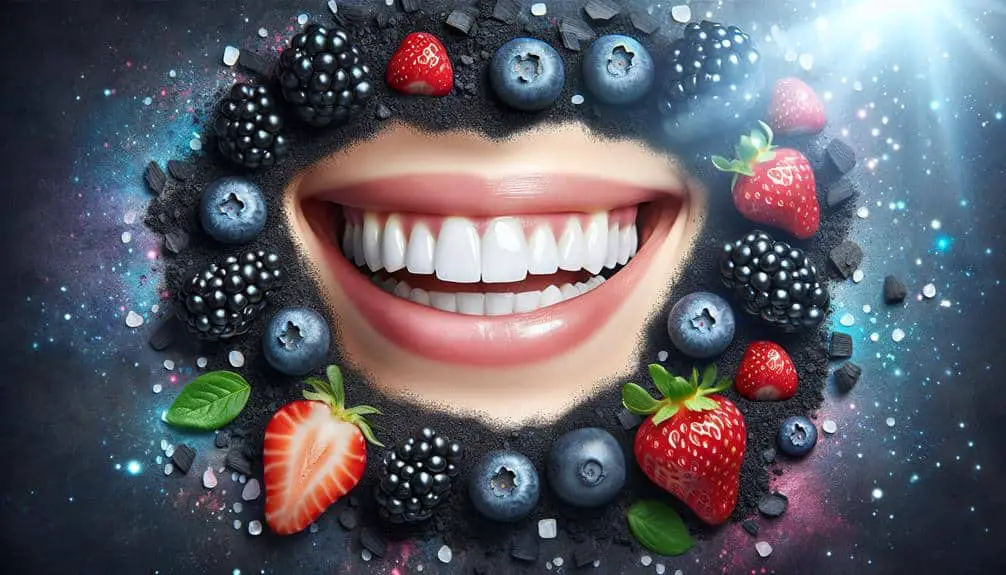Combat fluoride stains on your teeth effectively with powerful whitening tips. Consult a dentist for professional treatments tailored to your needs. Consider at-home whitening kits for convenience. Explore natural remedies like herbal solutions or oil pulling. Prevent future stains by maintaining good oral hygiene and regular dental visits. Take steps to brighten your smile with these strategies.
Key Points
- Consult a dentist for professional whitening treatments tailored to the severity of fluoride stains.
- Consider at-home whitening kits with whitening gel and trays for convenience and effectiveness.
- Explore natural remedies like baking soda paste or oil pulling for gentle stain removal.
- Maintain oral hygiene with regular brushing, flossing, and dental check-ups to prevent future stains.
- Limit consumption of staining foods and beverages to preserve whitened teeth.
Causes of Fluoride Stains
Fluoride stains on teeth are primarily caused by an excess accumulation of fluoride during the tooth development stage. This condition, known as fluoride discoloration, occurs when young children consume high levels of fluoride, leading to the discoloration of dental enamel. Dental enamel is the hard, outer layer of the teeth that protects them from decay and damage. When this enamel is exposed to excessive fluoride, it can result in white or brown spots on the teeth, affecting their aesthetic appearance.
Fluoride stains are particularly noticeable on the front teeth and can be a source of concern for individuals seeking a brighter smile. Understanding the causes of fluoride stains is important in addressing this issue effectively. By recognizing that fluoride discoloration is linked to the enamel, one can take proactive steps to prevent or treat this condition. Proper dental care, including monitoring fluoride intake and regular dental check-ups, can help manage fluoride stains and maintain the best oral health.
Professional Whitening Treatments
Consider professional whitening treatments to effectively address fluoride stains and enhance your smile. When seeking professional whitening options to tackle fluoride stains, it's crucial to prioritize dental care and choose reputable providers. Here are some key points to keep in mind:
- Consultation: Schedule a consultation with a qualified dentist specializing in cosmetic dentistry. They'll assess your specific needs, discuss treatment options, and provide recommendations tailored to your situation.
- In-Office Treatments: Professional whitening treatments conducted in the dental office are highly effective in combating stubborn fluoride stains. These procedures often utilize stronger whitening agents compared to over-the-counter products, delivering more noticeable results in a shorter period.
- Customized Approach: Your dentist will create a personalized whitening plan based on the severity of your fluoride stains, ensuring a targeted and efficient treatment process.
- Post-Treatment Care: Follow your dentist's instructions for post-whitening care to maintain the results and promote long-lasting whiteness. Regular dental check-ups and good oral hygiene practices are crucial for preserving your bright smile.
At-Home Whitening Kits
When exploring whitening options for fluoride stains, you may want to investigate the effectiveness of at-home whitening kits as a convenient and cost-effective solution. At-home whitening kits offer a DIY approach to brightening your smile in the comfort of your own home. These kits typically contain whitening gel and trays that mold to your teeth, allowing for a customized whitening experience.
Many at-home whitening kits also include whitening toothpaste options to enhance and maintain the whitening effects. These toothpaste options often contain gentle abrasives or polishing agents that help remove surface stains caused by fluoride. By incorporating these toothpaste options into your daily oral care routine, you can prolong the results of your at-home whitening treatments.
When using at-home whitening kits, following the instructions carefully is crucial to achieve the desired results without causing harm to your teeth or gums. Consistency is key when it comes to whitening, so make sure to adhere to the recommended treatment schedule for best outcomes.
Natural Remedies for Stains
To naturally combat stains on your teeth, incorporating home remedies into your oral care routine can be beneficial in enhancing your smile's brightness. Here are some effective natural remedies to help you tackle those stubborn stains:
- Herbal remedies: Using herbs like sage or thyme can help reduce discoloration on your teeth. These herbs have natural whitening properties that can aid in brightening your smile.
- Baking soda paste: Create a paste using baking soda and water, then gently brush your teeth with it. Baking soda is known for its mild abrasive properties that can help remove surface stains on your teeth.
- Oil pulling: Swishing coconut oil or sesame oil in your mouth for about 15 minutes daily can help in reducing stains and promoting overall oral health.
- DIY solutions: Lemon juice mixed with water can act as a natural bleaching agent. However, use this mixture sparingly as the acidic nature of lemon juice can erode tooth enamel over time.
Incorporating these natural remedies into your oral care routine can assist in combating stains and improving the brightness of your smile.
Tips for Preventing Future Stains
For effective prevention of future stains on your teeth, implementing consistent oral hygiene practices is essential. Brush your teeth at least twice a day with fluoride toothpaste to remove plaque buildup, which can lead to staining. Floss daily to clean between teeth and along the gumline where stains can easily develop. Regular dental check-ups and cleanings every six months are vital for maintaining oral health and addressing any potential staining early on.
In addition to good oral hygiene habits, there are preventive measures you can take to minimize the risk of developing future stains. Avoid or limit the consumption of foods and beverages known to cause staining, such as coffee, tea, red wine, and acidic fruits. Rinse your mouth with water after consuming staining substances to help reduce their effects on your teeth. Using a straw when drinking dark liquids can also help minimize direct contact with your teeth.
Long term solutions for preventing stains include considering professional dental treatments like dental sealants or fluoride treatments to protect your teeth from discoloration. By incorporating these preventive measures into your oral care routine, you can maintain a bright and stain-free smile for years to come.
Frequently Asked Questions
Can Fluoride Stains Be Removed With Regular Brushing and Flossing?
Can fluoride stains be removed with regular brushing and flossing? Yes, while daily oral hygiene helps, professional whitening treatments or home remedies like baking soda and hydrogen peroxide are more effective in addressing stubborn fluoride stains.
Are There Any Specific Foods or Drinks That Can Worsen Fluoride Stains?
Avoid dark-colored beverages like coffee and tea, which can worsen fluoride stains. Opt for lighter options such as water or milk. Likewise, limit acidic snacks like citrus fruits that can erode enamel and intensify staining.
How Long Does It Typically Take to See Results From Whitening Treatments for Fluoride Stains?
As you start on your journey towards a brighter smile, remember that whitening progress varies. Quick results are possible with professional whitening treatments, but individual expectations and factors influence how long it takes to see noticeable changes.
Can Fluoride Stains Be a Sign of Underlying Dental Health Issues?
Fluoride stains can indicate underlying dental health issues. Regular dental check-ups help identify and address these causes. Prevention methods like proper oral hygiene, limiting fluoride exposure, and professional cleanings can help maintain healthy teeth and prevent stains.
Are There Any Specific Toothpaste or Mouthwash Products Recommended for Preventing Fluoride Stains?
For preventing fluoride stains, consider whitening toothpaste and mouthwash. Professional whitening treatments may also help. Stay consistent with oral hygiene and visit your dentist regularly for guidance on maintaining a healthy smile.



